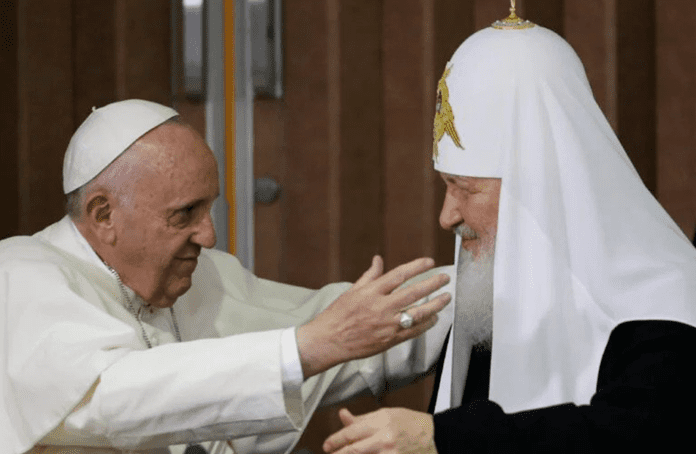On Tuesday, Cardinal Jean-Claude Hollerich, president of the European Catholic bishops’ official delegation to the European Union, appealed to Kirill directly in an open letter asking him to “show goodwill for seeking a diplomatic solution to the conflict, based on dialogue, common sense and respect for international law.”
Hollerich cited the Havana declaration and urged Kirill in the letter to “not let those powerful words go in vain.”
Meanwhile, Metropolitan Archbishop Hilarion, who now heads the department for external church relations for the Russian church and who played a crucial role in Francis’ and Kirill’s meeting in Havana, has remained silent on the Ukrainian and Russian conflict. His refusal to condemn Russia’s actions cost him his teaching position at the University of Freiburg, which suspended him earlier this week.
With ecumenical and diplomatic channels seemingly exhausted, Francis sent two Vatican officials, Cardinal Michael Czerny and Cardinal Konrad Krajewski, to the border with Ukraine as representatives of the pope with the mission to help immigrants, promote peace and rekindle dialogue with the local churches.
Krajewski, the papal almoner, spoke with the head of the autocephalus church of Ukraine, Epiphanius, online on Tuesday and expressed the closeness of the Vatican and Pope Francis with the suffering people of Ukraine.
The Vatican’s outreach to Moscow has been complicated by its warming relations with Ecumenical Patriarch Bartholomew I, archbishop of Constantinople, who is considered the “first among equals” of the Eastern Orthodox patriarchs and who has visited the Vatican repeatedly and attended Catholic events. In 2019, Bartholomew recognized the Orthodox Church of Ukraine as an independent entity, formalizing its split from Moscow and creating a breach with Kirill.
According to a Pew Research Center Survey conducted in 2016, roughly 46% of Orthodox Ukrainians adhere to the autocephalous church, while 17% look to Kirill as their spiritual leader.
Aside from his difficulties with Rome, Kirill is facing increased backlash from his own clergy for his support of Putin’s war. On March 3, hundreds of Russian Orthodox priests declared they will no longer commemorate the patriarch during services. Some Orthodox bishops in Europe have also called for Kirill to speak up against the war.
Before the conflict in Ukraine erupted into war, some at the Vatican hoped it could calm the interreligious tensions in the country through the mediation of the Greek Catholic Church, which is loyal to Rome.
On Thursday, Archbishop Sviatoslav Shevchuk urged Ukrainians to accept forced migrants fleeing combat in eastern Ukraine: “Disregard the language they speak, the church they go to, which traditions they have. Open to them your hearts, your homes, embrace them in the name of God!”
It’s a message that Francis might have wished he and Kirill could have once issued together.
This article originally appeared here.

